Research Article
Knowledge and Risk Perception of Nigerians Towards the Coronavirus Disease (COVID-19)
4036
Views & Citations3036
Likes & Shares
Background: The Coronavirus Disease 2019 (COVID-19) is far from over, although appreciable progress has been made to limit the devastating effects of the pandemic across the globe.
Methods: The study was a cross-sectional assessment of 776 consenting Nigerian adults using pre-tested, semi-structured questionnaire. The knowledge of COVID-19 was assessed based on the number of accurate responses given in comparison to average scores. Chi-square analysis of association between socio-demographic characteristics and knowledge of COVID-19 and risk perception was determined. Data analysis was done using SPSS version 21, with p
Results: Majority of the participants were male 451 (58.1%), there was a good knowledge of COVID-19 among 90.3% of respondents with 57% having positive risk perception. There was a statistically significant relationship between good knowledge and positive risk perception of COVID-19 (p < 0.001). Annual income (p =0.012) and the perception that “vaccines are good” significantly predict positive risk perception of COVID-19 among the respondents.
Conclusion: A good knowledge of COVID-19 and vaccination against the virus were the two most important factors that determined risk perception among the population. This may be because of the widespread advocacy.
Keywords: COVID-19, Risk perception, Nigerians
BACKGROUND
The Severe Acute Respiratory Syndrome Coronavirus 2 (SARS-CoV-2) that causes Coronavirus Disease 2019 (COVID-19) was first reported in Wuhan city in China and subsequently became a pandemic [1]. As at of 10th August 2021, there were over 200 million cases of COVID-19 with more than 4 million deaths across the globe the corresponding figures for Nigeria were 178,508 and 2,192 [2,3]. Coronaviruses are a large family of viruses that are known to cause illnesses ranging from the common cold to more severe diseases such as Middle East Respiratory and Severe Acute Respiratory Syndrome (SARS) [4]. The clinical symptoms of COVID-19 include fever, cough, fatigue, malaise, and shortness of breath [5] these symptoms are more severe amongst the elderly and those with underlying chronic medical conditions such as diabetes mellitus, chronic heart, and chronic lung diseases [5,6].
Many countries, including Nigeria are experiencing waves of the viral infection. This becomes complicated because of new variants of the virus has also been discovered in Nigeria, which was first isolated in the United Kingdom (UK), said to be about 56% more transmissible, with a large number of mutation and virulence [7,8]. As a result, there has been an increase in the number of new cases and deaths recorded on daily basis [9]. Experts have linked this with non-adherence to the infection control recommendations [10]. These recommendations are focused on disease prevention and control measures to minimize the spread as well as the burden on the healthcare system [11]. These measures include frequent hand hygiene using soap and water or an alcohol-based sanitizer, keeping a physical distance of about 6 feet from others, quarantine for those who are exposed, use of face masks, and avoiding the touch of the face with unwashed hands [12]. However, many Nigerians still do not adhere to these preventive measures. Good knowledge, and risk perception which refers to the way the diseases is understood/interpreted [13] and is important in pre-empting the way a person would react to an occurrence of the infection in their own lives as well as the lives of others. An understanding of the perception of people regarding COVID-19 is crucial because perception can act as a trigger for precautionary action, engagement in preventive health behavior and reporting of suspected cases of COVID-19 [14]. Knowledge and perception of risk is influenced by both individual and societal factors which are based on experiences, beliefs, attitudes, social, cultural and institutional processes [13]. Risk perception is also largely mediated by the information and knowledge that an individual has. Bhagavathula [15] in their study assessed the awareness of COVID-19 among health care workers reported that knowledge of transmission (60%) and disease onset (64%) was poor among the health care workers.
The Nigerian government, non-governmental organizations (NGOs), and civil societies are using various avenues to bridge the knowledge gap by educating and enlightening the populace on COVID-19 and how to prevent its spread. One of such measures is the collaboration by the Nigerian Red Cross Society with tricycle riders in Maiduguri where they are providing stickers for them to use on their tricycles across the city [16]. Also, several media strategies such as campaigns on social media platforms, press releases, radio jingles and drama skits in local dialects are being used [17]. A survey conducted among Egyptians shows many had good knowledge of the disease but are not willing to practice the preventive measures [18]. Anecdotal evidence suggests poor knowledge and poor perception of risk of the disease amongst the Nigerian population could be responsible for poor adherence to these preventive measures [19]. Yet there is dearth of studies evaluating the knowledge and perception of the people about the on-going COVID-19 pandemic among Nigerians. The elites in governance, policymakers and opinion leaders have been reported to have questioned the need for social distancing, while others have cited political, economic, and financial gains as the drive(s) for the fight against the infection [20]. Similarly, a cross-section of people on the streets also gives overwhelming evidence that Nigerians are largely ignoring COVID-19 safety protocols [21]. Therefore, there is a need to assess the level of knowledge of Nigerians about COVID-19 and their perceived risk of contracting the disease. The outcome of this research may reveal if their knowledge and risk perception of contracting COVID-19 is adequate or not and inform necessary action to improve the knowledge and risk perception targeted at proper adherence to preventive measures.
METHODS
This was a cross sectional study carried out in Nigeria, the most populated country in Africa with an estimated population of about 200 million and a total land area of 910,770 Km2 (351,650 sq. miles) [22]. Nigeria has six geopolitical zones (South-West, South-East, South-South, North-West, North-East, North-Central) with 36 states. Ethical approval was gotten from the health research ethics committee of the Federal Medical Centre Gusau, Zamfara State.
This was an on-line study, conducted using a pre-tested, semi-structured questionnaire and included Nigerian adults above the age of 18 years who consented to participate in the study. The minimum sample size was determined to be 409 at confidence level of 95% and based on proportion of people with good knowledge of 39% in a previous study [23] and a 5% margin of error.
The questionnaire was adapted from several published literature [23-25] and covered three sections A-C that is, Socio-demographic characteristics of respondents, respondent’s knowledge of COVID 19, respondents risk perception of COVID 19. Pre-test of the questionnaire was done on 10% of the respondents each at six different states from the six geopolitical zones and were not included in the study. The pretested questionnaires with participants’ information sheet were circulated extensively online.
Data was analyzed using SPSS version 21. The knowledge of COVID 19 among respondents was scored based on the number of accurate responses given. The number of correct responses were compared with the average score. Participants whose score equaled or was above the average were categorized as having good knowledge while those who scored below the average were categorized as having poor knowledge. Chi square analysis was computed to test for association between sociodemographic characteristics and knowledge of COVID 19 among respondents. The level of significance was predetermined at a p-value of less than 0.05 at 95% confidence level.
RESULTS
A total of 776 participants completed the survey. Most were within the ages of 36-45 years (43.9%), with 58.1% males and 40.9% females. The majority (53.2%) had tertiary education with 7.7% of the respondents being artisans, 8.6% being teachers and 25% being health care workers. Most respondents (26.7%) preferred not to say their annual income with 17.5% earning less than 500,000 Naira /annum. Zonal representation of respondents (state of origin and place of residence) revealed that most of the respondents were from the southwest zone of the country (47.4% and 46% respectively). Most respondents' households were made up of 1-4 persons (48.3%) while 5.7% of the respondents had more than 8 persons per household (Table 1).
Overall, majority (90.3%) of the respondents had a good knowledge of COVID 19 while the remaining 9.7% had poor knowledge (Figure 1). Most of the respondents (71.8%) reported multiple sources of awareness of COVID 19 including the mass media, immediate community, and hospital-related sources. About a quarter of the respondents reported mass media as their only source of awareness.
Univariate distribution of the risk perception of respondents revealed that almost all the respondents (98%) agreed that COVID 19 is a global disease and can affect both adults and children. In addition, most of them (94%) agreed that as individuals they were doing a lot to protect their family, and majority also agreed that people can die or recover from the disease. Surprisingly, many of the respondents were indifferent towards government and health system response in tackling the disease (30.4% and 31.7% respectively) and majority were also either neutral or disagreed that COVID 19 is a threat to humanity. More than half of the respondents disagreed that the disease affects the elderly with about 30% indifferent about going to the hospital when ill (Table 2).
Overall, 57% of the respondents had a positive risk perception of COVID-19 while 43% had a negative risk perception. Sociodemographic variables such as age, marital status and occupation of the respondents were found to significantly influence the knowledge of the respondents on COVID 19 (Table 3).
Four hundred and eighteen (59.6%) of the seven hundred and one respondents with good knowledge about COVID 19 also had positive perception of COVID 19 risk. Contrarily, only twenty-four (32%) of seventy-five subjects with poor COVID 19 knowledge had positive risk perception. Thus, we found a statistically significant relationship between good knowledge and positive risk perception of COVID 19 (p < 0.001) (Table 4).
Significant predictors of positive risk perception include annual income (p = 0.012, OR = 3.676, CI 1.324 - 10.212), the perception that ‘vaccines are good’ (p = 0.013, OR = 2.122, CI 1.175 - 3.835) and good knowledge of COVID 19 (p = 0.019, OR = 2.578, CI 1.167 - 5.695). Age, level of education, marital status, place of readiness, religion, occupation, readiness to receive the COVID 19 vaccine and history of previous vaccinations did not significantly predict COVID 19 risk perception (Table 5).
Variables that significantly predicted good knowledge of COVID 19 were respondents between the ages of 18 to 25 years and married respondents (p = 0.008, OR = 7.474, CI 1.697-32.920 and p = 0.024, OR=2.173, CI 1.105-4.273 respectively). The occupation of respondents did not significantly predict good knowledge of COVID 19.
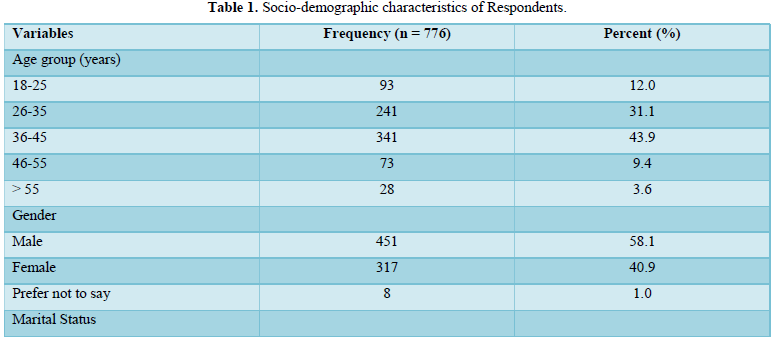
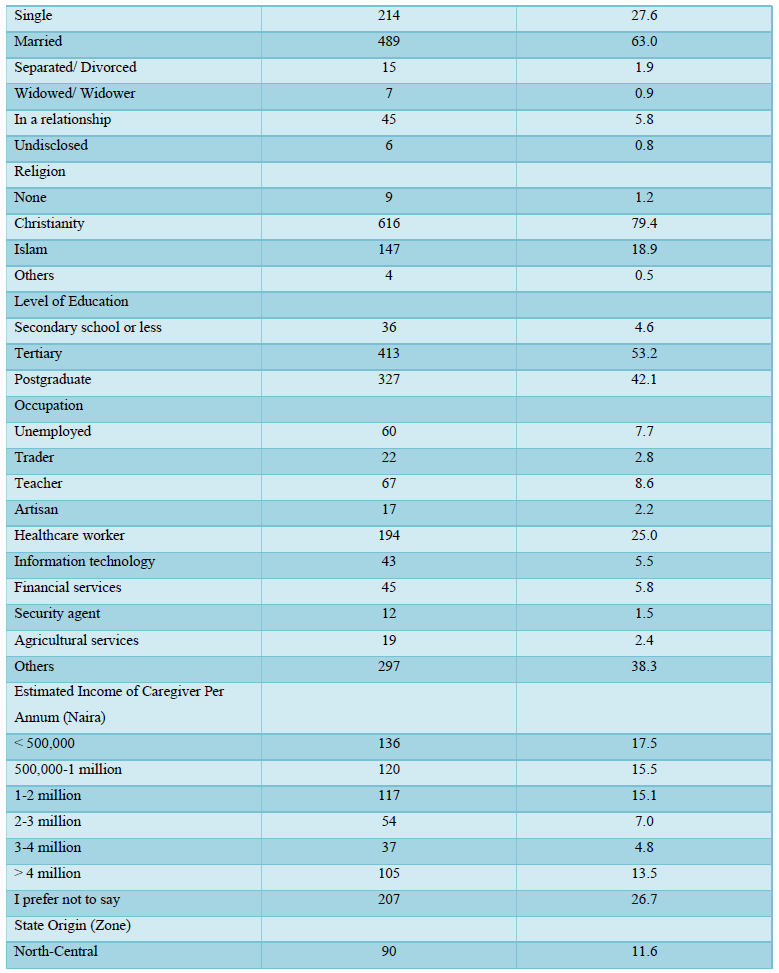
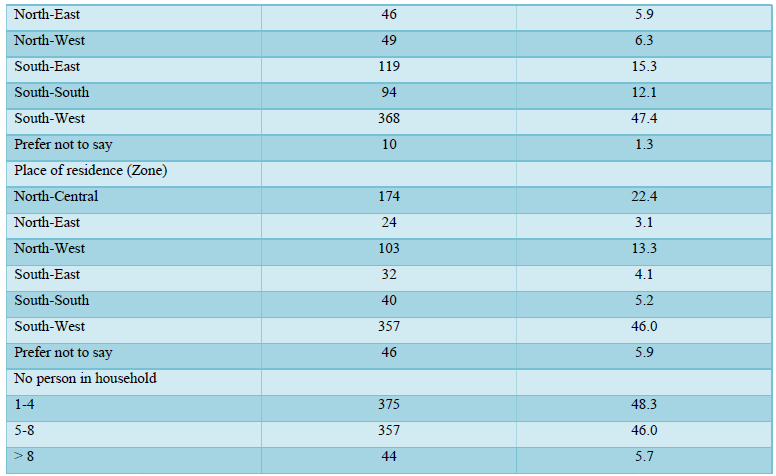
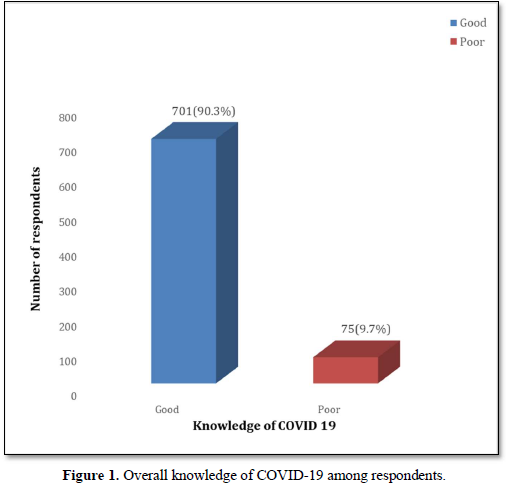
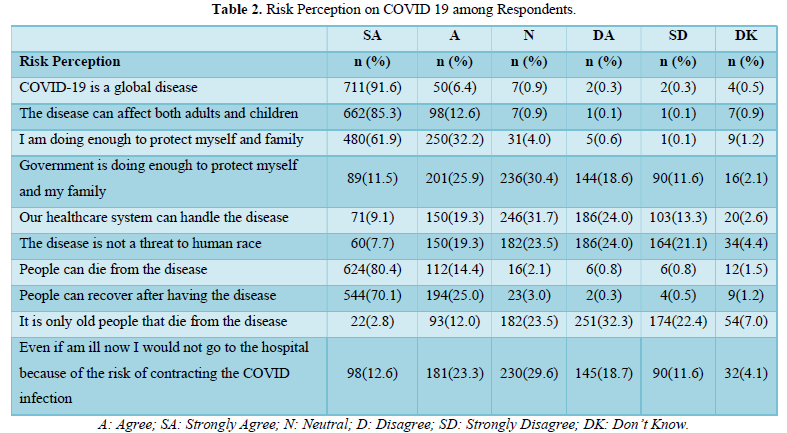
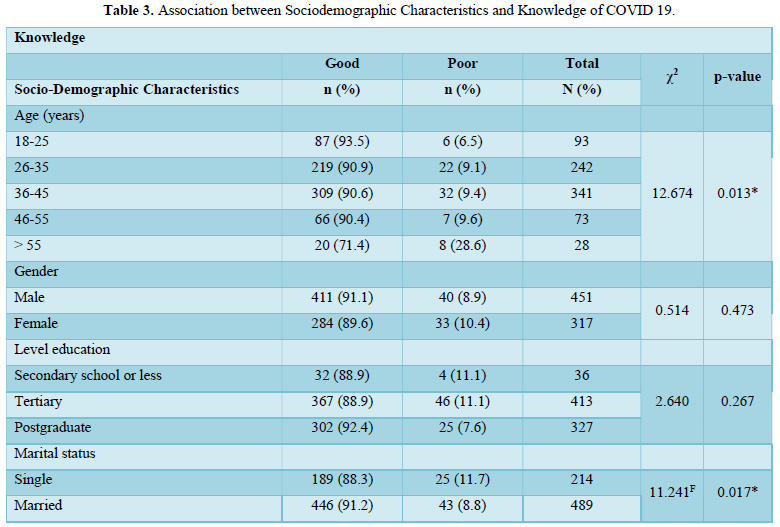
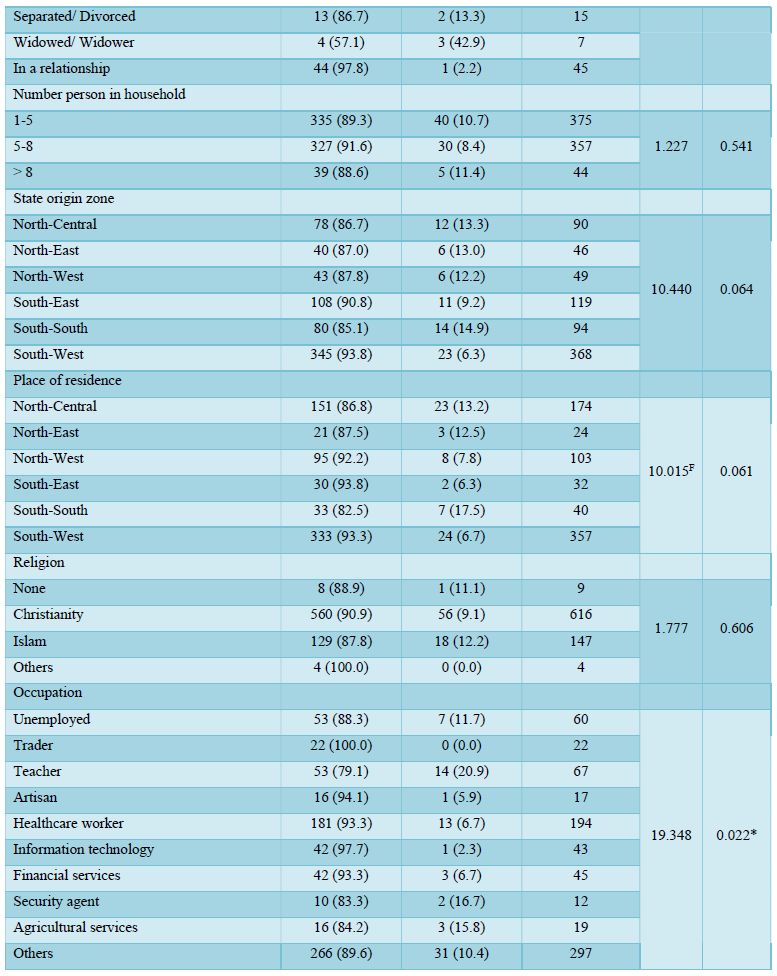

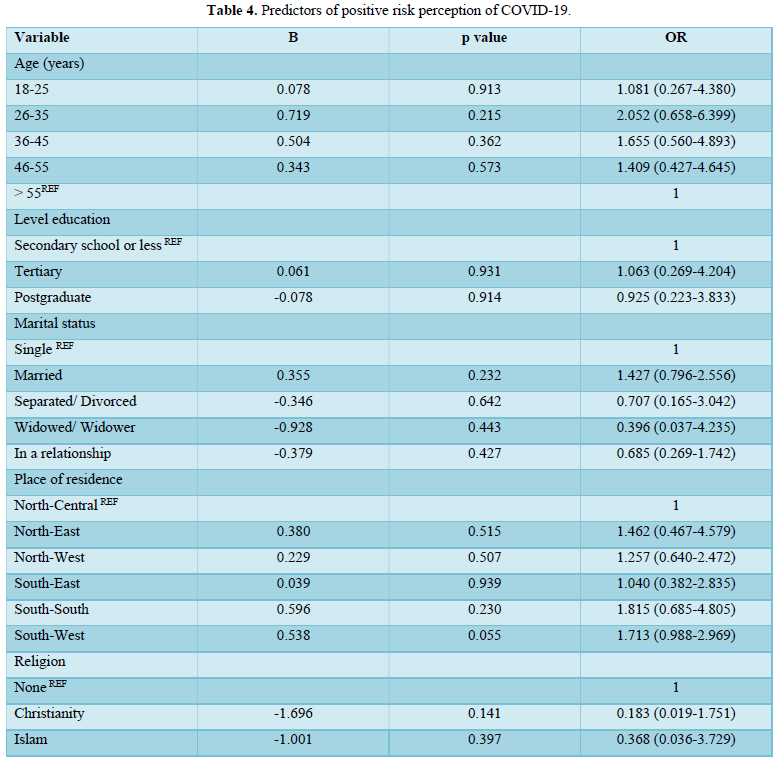
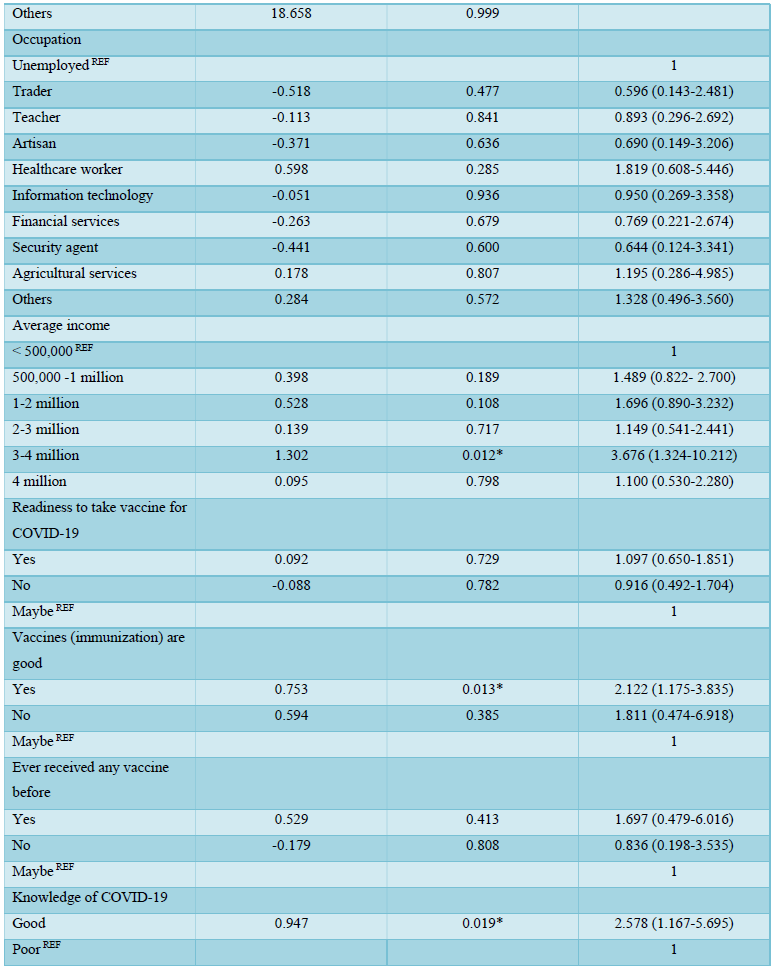
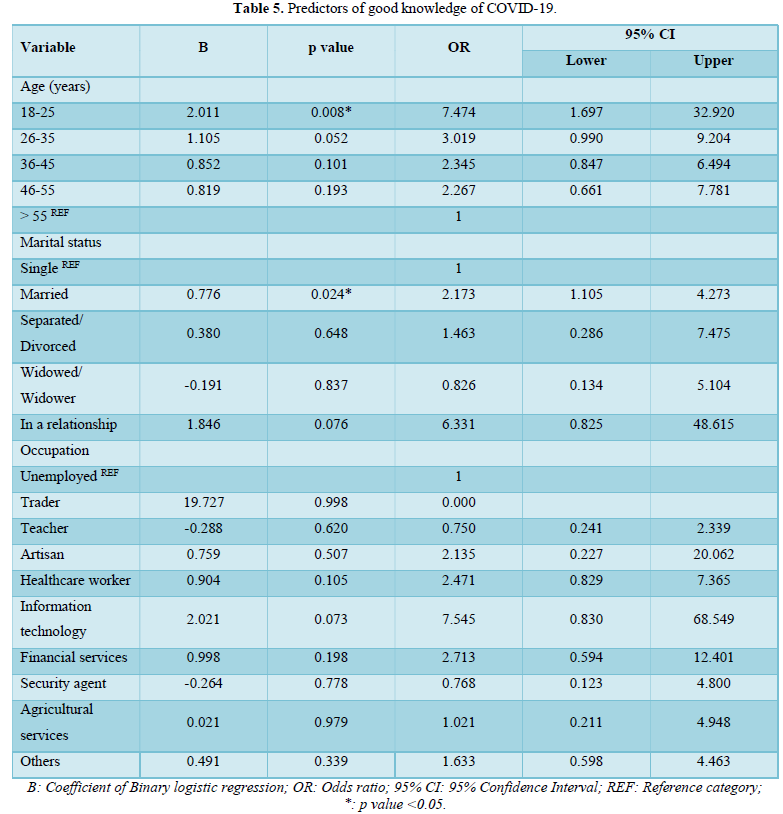











DISCUSSION
In this study, most of the respondents were between the age group 36-45 years and majority were males. This is similar to findings obtained in related online studies on COVID 19 in Nigeria [26,27]. This is also reflective of the general demographics of Nigeria which is made up of an expansive population pyramid [28]. The higher male respondent might also be due to disparity in gender accessibility to internet usage in Nigeria which is currently skewed towards male [29]. This is particularly so, when you consider a similar study done in south west Nigeria using the traditional methods of sample collection, the study revealed a more male dominated respondent than the female, which is in consonance with the findings of this study [7].
Three socio demographic variables from the study namely, age, marital status, and occupation had statistically significant association with knowledge of COVID 19. This study revealed that health care workers had good knowledge of COVID 19 compared to other occupations sampled. This is similar to another study in Nigeria that showed that health care workers have good knowledge of COVID 19 [30]. Similar study in the northern Nigeria showed that a quarter of respondents got their information about COVID 19 from health care workers which might also inform the good knowledge of health care workers [31]. This is not surprising as COVID 19 is a health issue and health care workers have been at the forefront of the management of the disease.
The overall knowledge of our respondents on the outbreak of COVID 19 crisis is high at 90.3%, this is probably due to multiple and modern forms of information dissemination available in Nigeria today. Most of our respondents had information from multiple sources. Available evidence showed that internet penetration seems to be high among young Nigerians and this seems to facilitate health information seeking behavior [32]. In this study, social media with other electronics media sources were the highest information sources among Nigerians. This was like the findings from other studies done in Nigeria on COVID-19 [33,34].
The knowledge of the respondent in this study was higher than that of those in the study on COVID 19 crisis in sub-Saharan Africa by Adesegun [33] that reported 78%, but comparable to a similar study done on knowledge, attitude, and practice of COVID 19 outbreak, a population-based study in Iran by Erfani [35] with 90% demonstrating good knowledge among Iranian population surveyed in the study.
The younger age among the respondents in Nigeria was a predictor of the good knowledge, which was also noted to be strongly associated with their risk perceptions. In other words, young Nigerians have good knowledge about on-going COVID 19 pandemic and are aware of the risk that this poses to the health in general. These findings were similar to the study findings of Shamir et al which showed that information source was significantly determined by socio-demographic characteristics among young Americans and was also associated with both knowledge and beliefs about the pandemic in the United States [36].
In this study, the risk perceptions associated with COVID 19 diseases was found to be strongly linked to the knowledge and understanding of the disease as a global burden, which could affect both the young and old, as well as being fatal. The pattern seen in this study has further validated reports from other studies on risk perception on COVID 19 which revealed a significant variability in risk perception seen across the globe [37,38]. Despite the burden COVID 19 poses globally, more than half of the population in this study are indifferent and do not believe that the government is doing enough to protect the general populace from contracting the virus and this is in consonance with a similar study on COVID 19 [39]. This failure of trust in the government’s effort may account for why majority of our respondents don’t rely or patronize government’s health facility as noted in this study, despite government efforts in providing affordable health care to her citizenry. This is also in tandem with a study done in Nigeria which revealed similar findings [39].
This study also showed that there is a significant association between the amount of knowledge possessed on the disease and the spectrum of the perceived risks regarding COVID 19 across the six geopolitical zones of the country, with good knowledge translating to a higher perception of risks associated with COVID 19 and poor knowledge otherwise. This finding is similar to what was reported in a global study done on global risk perceptions of COVID 19 in 10 countries across the continents of Europe, Asia and America [37]. Although in Nigeria about a third of the population are of the opinion that government is doing enough to protect them and their family, about the same fraction feel otherwise with the remaining 33% of the respondents being indifferent to government efforts at ameliorating the effects of COVID 19. This may explain why a significant percentage of the respondents may have adopted for themselves the responsibility of ensuring their safety rather than wait on the government to provide protection for the general populace. These measures being used by individuals may not provide adequate protection against transmission of the disease but rather promote its spread. These are issues which the government agencies task with managing COVID 19 and its complications must investigate. The citizens’ response to safety protocols must be consider critically if any major progress is to be seen in curbing the spread of COVID 19, particularly with the paucity of vaccines in Africa and the possibility of the 3rd wave of the disease already being given serious consideration in other parts of the world [40,41].
This study has identified good knowledge of the disease and immunization against the virus as the two most important predictors of positive risk perception on COVID 19. This may imply that advocacy on widespread education about the virus and the need for immunization should be embarked upon by the government should any meaningful progress be expected in the fight against the deadly virus.
LIMITATIONS
Findings may be influenced by selection bias because respondents needed access to a smartphone or computer. This may have excluded the poor, elderly who are most vulnerable to COVID-19 this may limit external validity and may have distorted estimation of those willing to take the vaccine.
RECOMMENDATION
It will be imperative for government and non-governmental organizations to strengthen the capacities of health workers to educate and supply information on COVID 19 to the populace because in this research respondents who are health workers tend to have better knowledge of COVID 19 than respondent who are not.
DECLARATIONS
Ethics approval
Ethical approval was obtained from the Health Research Ethics Committee of Federal Medical Center, Gusau, Zamfara State, Nigeria
Consent for publication
Not applicable.
Availability of data and materials
The datasets used and/or analyzed during the current study are available from the corresponding author on reasonable request.
COMPETING INTERESTS
The authors declare that they have no competing interests.
FUNDING
No funding was received for this research.
AUTHORS` CONTRIBUTIONS
Conception/design of the study-COO, VKS, OBF, AOO; data collection-UOA, CMI, JCO, OFD, KWO; data analysis and interpretation-EEA, GOP, OAA, OEA; article drafting- BFU, YBA, OFA, AOO; Critical revision of the article- COO, BFU, VKS; final approval of the version to be published-all authors.
ACKNOWLEDGMENT
Oluwafunmike Ruth Olomofe is appreciated for proof-reading the final manuscript.
- World Health Organization (WHO) (2020) Coronavirus Disease (COVID-19) Dashboard 2020. Accessed on: December 15, 2020. Available online at: https://covid19.who.int/?gclid=EAIaIQobChMIpmCgKqU7gIVumDmCh3R2QH6EAAYASAAEgLWQfD_BwE
- NCDC (2021) Coronavirus COVID-19 Microsite. Accessed on: August 10, 2021. Available online at: https://covid19.ncdc.gov.ng/
- COVID-19 Map - Johns Hopkins Coronavirus Resource Center (2021) COVID-19 Dashboard by the Center for Systems Science and Engineering (CSSE) at Johns Hopkins University (JHU). Accessed on: August 10, 2021. Available online at: https://coronavirus.jhu.edu/map.html
- Galveston BS (1996) Structure and classification of viruses. Medical Microbiology 4th
- Chen N, Zhou M, Dong X, Qu J, Gong F, et al. (2020) Epidemiological and clinical characteristics of 99 cases of 2019 novel coronavirus pneumonia in Wuhan, China: A descriptive study. Lancet 395(10223): 507-513.
- Huang C, Wang Y, Li X, Ren L, Zhao J, et al. (2020) Clinical features of patients infected with 2019 novel coronavirus in Wuhan China. Lancet 395(10223): 497-506.
- Ilesanmi O, Afolabi A (2020) Perception and practices during the COVID-19 pandemic in an urban community in Nigeria: A cross-sectional study. PeerJ 8: e10038.
- Africa Centre for Disease Control and Prevention (2020) Another new coronavirus variant found in Nigeria. Accessed on: January 5, 2021. Available online at: https://www.reuters.com/article/us-health-coronavirus-africa/another-new-coronavirus-variant-found-in-nigeria-says-africa-cdc-idUSKBN28Y1B7
- Nigerian Centre for Disease Control and Prevention (NCDC) (2020) Public Health Advisory Following Increase in Number of COVID-19 Cases in Nigeria. Accessed on: January 10, 2021. Available online at: https://ncdc.gov.ng/news/280/public-health-advisory-following-increase-in-number-of-covid-19-cases-in-nigeria
- John Hopkins Medicine (2020) Coronavirus and COVID-19: Who is at higher risk? Accessed on: January 10, 2021. Available online at: https://www.hopkinsmedicine.org/health/conditions-and-diseases/coronavirus/coronavirus-and-covid19-who-is-at-higher-risk
- Ning L, Niu J, Bi X, Yang C, Liu Z, et al. (2020) The impacts of knowledge, risk perception, emotion and information on citizens’ protective behaviors during the outbreak of COVID-19: A cross-sectional study in China. BMC Public Health 20: 1751.
- IN (2020) COVID-19: Infection prevention and control guidance (2020). Available online at: https://assets.publishing.service.gov.uk/government/uploads/system/uploads/attachment_data/file/886668/COVID-19_Infection_prevention_and_control_guidance_complete.pdf
- Olapegba P, Ayandele O (2020) Survey data of COVID-19-related Knowledge, Risk Perceptions and Precautionary Behavior among Nigerians. Data Brief 30: 105685.
- Cori L, Bianchi F, Cadum E, Anthonj C (2020) Risk perception and COVID-19. Int J Environ Res Public Health 17: 3114
- Bhagavathula AS, Aldhaleei WA, Rahmani J, Mahabadi MA, Bandari DK (2020) Novel Coronavirus (COVID-19) Knowledge and Perceptions: A Survey on Healthcare workers. Med Rxiv.
- Relief Web (2020) Maiduguri’s keke are spreading COVID-19 prevention message. Available online at: https://reliefweb.int/report/nigeria/maiduguri-s-keke-are-spreading-covid-19-prevention-messages
- Water Aid (2020) Tackling COVID-19 in Nigeria. Available online at: https://www.wateraid.org/ng/covid-19
- Abdelhafiz A, Mohammed Z, Ibrahim M (2020) Knowledge, Perceptions, and Attitude of Egyptians Towards the Novel Coronavirus Disease (COVID-19). J Community Health 1(10): 881-890.
- Nairaetrics (2020) Lagos state threatens to revert to full lock-down. Available online at: https://nairametrics.com/2020/05/10/lagos-state-threatens-to-revert-to-full-lock-down/
- GGA (2020) When a governor believes it’s a hoax and ordinary flu. Available online at: https://gga.org/covid-19-when-a-governor-believes-its-a-hoax-and-ordinary-flu/
- TheGuardian (2020) COVID-19: Why Nigerians fear another lockdown yet defy safety protocols. Accessed on: January 14, 2021. Available online at: https://guardian.ng/saturday-magazine/cover/covid-19-why-nigerians-fear-another-lockdown-yet-defy-safety-protocols/
- Jekel J, Katz D, Elmore J (2001) Sample size, randomization, and probability theory. Epidemiology, Biostatistics and Preventive Medicine. 2nd Philadelphia: Saunders.
- National Demographic Health Survey (NDHS) (2013) Household population and Housing characteristics National Population Commission (NPC) Federal Republic of Nigeria, Abuja, Nigeria. 2013: 11-29.
- Geldsetzer P (2020) Knowledge and Perceptions of COVID-19 Among the General Public in the United States and the United Kingdom: A Cross-sectional Online Survey. Ann Intern Med 20: M20-0912.
- Zhong B, Luo W, Li H, Zhang Q, Liu X, et al. (2020) Knowledge, attitudes, and practices towards COVID-19 among Chinese residents during the rapid rise period of the COVID-19 outbreak: A quick online cross-sectional survey. Int J Biol Sci 16(10): 1745-52.
- Reuben RC, Danladi MMA, Saleh DA, Ejembi PE (2020) Knowledge, Attitudes and Practices towards COVID-19: An Epidemiological Survey in North-Central Nigeria. J Community Health 7: 1-14.
- Oleribe O, Ezechi O, Osita-Oleribe P, Olawepo O, Musa AZ, et al. (2020) Public perception of COVID-19 management and response in Nigeria: a cross-sectional survey BMJ Open 10: e041936.
- Nigeria (2021) The world fact book. Accessed on: February, 26 2021. Available online at https://www.cia.gov/the-world-factbook/countries/nigeria/
- Ibrahim HJ (2018) Gender Disparity in Internet Access and Usage in Nigeria: Implication for Development. Int J Law Govern Comm 3(12): 41-50.
- Ejeh FE, Saidu AS, Owoicho S, Maurice NA, Jauro S, et al. (2020) Knowledge, attitude, and practice among healthcare workers towards COVID-19 outbreak in Nigeria. Heliyon 6(11): e05557.
- Habib MA, Dayyab FM, Iliyasu G, Habib AG (2021) Knowledge, attitude and practice survey of COVID-19 pandemic in Northern Nigeria. PLoS One 16(1): e0245176.
- Obasola OI, Agunbiade OM (2016) Online Health Information Seeking Pattern among Undergraduates in a Nigerian University. SAGE Open.
- Adesegun OA, Binuyo T, Adeyemi O, Ehioghae O, Rabor DF, et al. (2020) The COVID-19 Crisis in Sub-Saharan Africa: Knowledge, Attitudes, and Practices of the Nigerian Public. Am J Trop Med Hyg 103(5): 1997-2004.
- Hager E, Odetokun IA, Bolarinwa O, Zainab A, Okechukwu O, et al. (2020) Knowledge, attitude, and perceptions towards the 2019 Coronavirus Pandemic: A bi-national survey in Africa. PLoS One 15(7): e0236918.
- Erfani A, Shahriarirad R, Ranjbar K, Mirahmadizadeh A, Moghadami M (2020) Knowledge, Attitude and Practice toward the Novel Coronavirus (COVID-19) Outbreak: A Population-Based Survey in Iran. Available online at: https://www.who.int/bulletin/online_first/20-256651.pdf
- Ali SH, Foreman J, Tozan Y, Capasso A, Jones AM, et al. (2020) Trends and Predictors of COVID-19 Information Sources and Their Relationship with Knowledge and Beliefs Related to the Pandemic: Nationwide Cross-Sectional Study. JMIR Public Health Surveillance 6(4): e21071.
- Dryhurst S, Schneider CR, Kerr J, Freeman ALJ, Recchia G, et al. (2020) Risk perceptions of COVID-19 around the world. J Risk Res 23: 994-1006.
- Rohde R (2020) Novel Coronavirus (2019-nCoV) update: Uncoating the Virus. America Society of Microbiologist.
- Olomofe C, Shoyemi K, Omoworare B, Adeyinka O, Ajumuka E, et al. (2021) Predictors of Uptake of a Potential Covid 19 Vaccine among Nigeria Adults. J Vaccine Vaccin 12(1): 1000442.
- Phillip X (2021) Covid 19 vaccines in Africa: MO Ibrahim and others Lament sorry state of access; The Africa repot; Jan.
- Baker HA, Safavynia SA, Evered LA (2020) The ‘third wave’: Impending cognitive and functional decline in COVID-19 survivors. Br J Anaesth S0007-0912(20):



